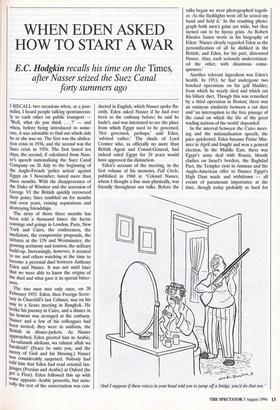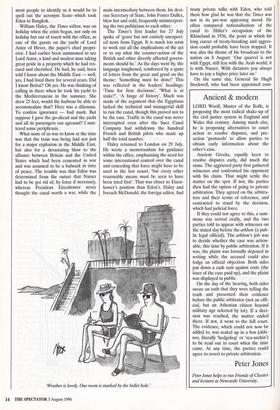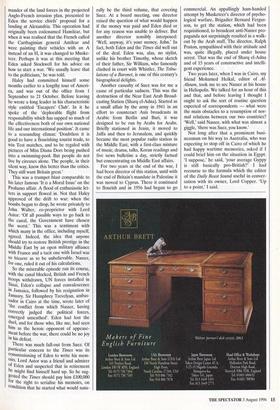WHEN EDEN ASKED HOW TO START A WAR
E.C. Hodgkin recalls his time on the Times, after Nasser seized the Suez Canal forty summers ago
I RECALL two occasions when, as a jour- nalist, I heard people talking spontaneous- ly to each other on public transport 'Well, what do you think ... ?' — and when, before being introduced to some- one, it was advisable to find out which side he or she was on. The first was the abdica- tion crisis in 1936, and the second was the Suez crisis in 1956. The first lasted ten days; the second, if calculated from Nass- er's speech nationalising the Suez Canal Company on 26 July to the beginning of the Anglo-French 'police action' against Egypt on 5 November, lasted more than three months. With the disappearance of the Duke of Windsor and the accession of George VI the British quickly recovered their poise; Suez rumbled on for months and even years, ruining reputations and destroying friendships.
The story of those three months has been told a thousand times: the hectic Comings and goings in London, Paris, New York and Cairo, the conferences, the mediators, the compromise proposals, the debates at the UN and Westminster, the growing acrimony and tension, the military build-up. Increasingly, however, it seemed to me and others watching at the time to become a personal duel between Anthony Eden and Nasser. It was not until later that we were able to know the origins of the duel and what gave it its special bitter- ness.
The two men met only once, on 20 February 1955. Eden, then Foreign Secre- tary in Churchill's last Cabinet, was on his way to a Seato meeting in Bangkok. He broke his journey in Cairo, and a dinner in his honour was arranged at the embassy. Nasser and a few of his colleagues had been invited; they were in uniform, the British in dinner-jackets. As Nasser approached, Eden greeted him in Arabic, As-salamuh aleikum, wa rahmat ullah wa baraktuh!' (Peace be unto you, and the mercy of God and his blessing.) Nasser Was considerably surprised. Nobody had told him that Eden had read oriental lan- guages (Persian and Arabic) at Oxford (he got a First). Eden followed this up with some apposite Arabic proverbs, but natu- lly the rest of the conversation was con-
ducted in English, which Nasser spoke flu- ently. Eden asked Nasser if he had ever been to the embassy before; he said he hadn't, and was interested to see the place from which Egypt used to be governed. 'Not governed, perhaps,' said Eden, 'advised rather.' The shade of Lord Cromer who, as officially no more than British Agent and Consul-General, had indeed ruled Egypt for 24 years would have approved the distinction.
Eden's account of the meeting, in the first volume of his memoirs, Full Circle, published in 1960 is: 'Colonel Nasser, whom I thought a fine man physically, was friendly throughout our talks. Before the
talks began we were photographed togeth- er. As the flashlights went off he seized my hand and held it.' In the resulting photo- graph both men's grins are wide, but they turned out to be hyena grins. As Robert Rhodes James wrote in his biography of Eden: 'Nasser clearly regarded Eden as the personification of all he disliked in the British; and Eden, for his part, distrusted Nasser. Also, each seriously underestimat- ed the other, with disastrous conse- quences.'
Another relevant ingredient was Eden's health. In 1953, he had undergone two botched operations on his gall bladder, from which he nearly died and which cut his biliary duct. Though this was remedied by a third operation in Boston, there was an ominous similarity between a cut duct and 'an interruption to the free passage of the canal on which the life of the great trading nations of the world' depended.
In the interval between the Cairo meet- ing and the nationalisation speech, the pace quickened. Eden became Prime Min- ister in April and fought and won a general election. In the Middle East, there was Egypt's arms deal with Russia, bloody clashes on Israel's borders, the Baghdad Pact, the Templer riots in Amman and the Anglo-American offer to finance Egypt's High Dam made and withdrawn — all events of paramount importance at the time, though today probably as hard for
'And I suovose if these voices in your head told you to jump off a bridge, you'd do that too.'
most people to identify as it would be to spell out the acronym Seato which took Eden to Bangkok.
William Haley, the Times editor, was on holiday when the crisis began, not only on holiday but out of touch with the office, as one of the guests on the yacht of Lord Astor of Hever, the paper's chief propri- etor. I had earlier been summoned to see Lord Astor, a kind and modest man taking great pride in a property which he had res- cued and cherished. He had, he said, been told I knew about the Middle East — well, yes, I had lived there for several years. Did I know Beirut? Oh yes. He was thinking of calling in there when he took his yacht to the Mediterranean in the summer. She drew 25 feet, would the harbour be able to accommodate that? Here was a dilemma. To confess ignorance — bad mark. But suppose I gave the go-ahead and the yacht and all its passengers ran aground? I mut- tered some periphrasis.
What none of us was to know at the time was that the train was being laid not just for a major explosion in the Middle East, but also for a devastating blow to the alliance between Britain and the United States which had been cemented in war and was assumed to be a bulwark in time of peace. The trouble was that Eden was determined from the outset that Nasser had to be got rid of, by force if necessary, whereas President Eisenhower never thought the canal worth a war, while the main intermediary between them, his devi- ous Secretary of State, John Foster Dulles, blew hot and cold, frequently misinterpret- ing the two politicians to each other.
The 7imes's first leader for 27 July spoke of `grave but not entirely unexpect- ed news from Egypt. It is much too soon to work out all the implications of the act or to say what the counter-action of the British and other directly affected govern- ments should be.' As the days went by, the language toughened, reinforced by a spate of letters from the great and good on the theme: 'Something must be done!' This was reflected in the leaders' headings: 'Time for firm decisions', 'What is at stake?', `A hinge of history'. Much was made of the argument that the Egyptians lacked the technical and managerial skill to run the canal, though this proved not to be the case. Traffic in the canal was never interrupted even after the Suez Canal Company had withdrawn the hundred French and British pilots who made up half the total number.
Haley returned to London on 29 July. He wrote a memorandum for guidance within the office, emphasising the need for some international control over the canal and conceding that force might have to be used in the last resort, 'but every other reasonable means must be seen to have been tried first'. That was closer to Eisen- hower's position than Eden's. Haley and Iverach McDonald, the foreign editor, had `Weather is lovely. Our room is marked by the bullet hole.' many private talks with Eden, who told them how glad he was that the Times was not in its pre-war appeasing mood. He often compared nationalisation of the canal to Hitler's occupation of the Rhineland in 1936, the point at which his long career of treaty-breaking and aggres- sion could probably have been stopped. It was also the theme of his broadcast to the nation on 8 August: `Our quarrel is not with Egypt, still less with the Arab world; it is with Nasser. With dictators you always have to pay a higher price later on.'
On the same day, General Sir Hugh Stockwell, who had been appointed com- mander of the land forces in the projected Anglo-French invasion plan, presented to Eden the service chiefs' proposal for a landing at Alexandria. This operation had originally been codenamed Hamilcar, but when it was realised that the French called the Carthaginian general Amilcar and were painting their vehicles with an A instead of an H, it was changed to Muske- teer. Perhaps it was at this meeting that Eden asked Stockwell for his advice on how to start a war. 'We usually leave that to the politicians,' he was told.
Haley had committed himself some months earlier to a lengthy tour of Ameri- ca, and was out of the office from 1 September to 21 October. Before leaving he wrote a long leader in his characteristic style entitled 'Escapers' Club'. In it he spoke of the 'deplorable flight from responsibility which has sapped so much of the effectiveness both of our own national life and our international position'. It came to a resounding climax: 'Doubtless it is good to have a flourishing tourist trade, to win Test matches, and to be regaled with pictures of Miss Diana Dors being pushed into a swimming-pool. But people do not live by circuses alone. The people, in their silent way, know this better than the critics. They still want Britain great.'
This was a trumpet blast comparable to his later famous 'It is a Moral Issue' on the Profumo affair. A flood of enthusiastic let- ters in support flowed in. Not that Haley approved of the drift to war: when the bombs began to drop, he wrote privately to John Walter, co-proprietor with Lord Astor: 'Of all possible ways to go back to the canal, the Government have chosen the worst.' This was a sentiment with which many in the office, including myself, agreed. Indeed, the idea that anyone should try to restore British prestige in the Middle East by an open military alliance with France and a tacit one with Israel was so bizarre as to be unbelievable. Nasser, for one, ruled it out of his calculations.
So the miserable episode ran its course, with the canal blocked, British and French troops withdrawn, UN forces installed in Sinai, Eden's collapse and convalescence in Jamaica, followed by his resignation in January. Sir Humphrey Trevelyan, ambas- sador in Cairo at the time, wrote later of the conflict from which Nasser, having correctly judged the political forces, emerged unscathed'. Eden had lost the duel, and for those who, like me, had seen him as the heroic opponent of appease- ment before the war, there could be no joy in his defeat.
There was much fall-out from Suez. Of Particular concern to the Times was its commissioning of Eden to write his mem- oirs. Lord Astor was a friend and admirer of Eden and suspected that in retirement he might find himself hard up. So he sug- gested the Times should pay him £100,000 for the right to serialise his memoirs, on condition that he started what would natu-
rally be the third volume, that covering Suez. At a board meeting, one director raised the question of what would happen if the money was paid and Eden died or for any reason was unable to deliver. But another director sensibly interposed: 'Well, anyway, it's your money, John.' In fact, both Eden and the Times did well out of the deal. Eden was, alas, no stylist, unlike his brother Timothy, whose sketch of their father, Sir William, who famously clashed in court with Whistler, The Tribu- lations of a Baronet, is one of this century's biographical delights.
Another casualty of Suez was for me a cause of particular sadness. This was the destruction of the Near East Arab Broad- casting Station (Sharq el-Adna). Started as a small affair by the army in 1941 in an effort to counteract Axis broadcasts in Arabic from Berlin and Bari, it was designed to be run by Arabs for Arabs. Briefly stationed in Jenin, it moved to Jaffa and then to Jerusalem, and quickly became the most popular radio station in the Middle East, with a first-class mixture of music, drama, talks, Koran readings and five news bulletins a day, strictly factual but concentrating on Middle East affairs. For two years at the end of the war, I had been director of this station, until with the end of Britain's mandate in Palestine it was moved to Cyprus. There it continued to flourish and in 1956 had begun to go commercial. An appallingly ham-handed attempt by Musketeer's director of psycho- logical warfare, Brigadier Bernard Fergus- son, to get the station, which had been requisitioned, to broadcast anti-Nasser pro- paganda not surprisingly resulted in a walk- out by the Arab staff. The director, Ralph Poston, sympathised with their attitude and was, quite illegally, placed under house arrest. That was the end of Sharq el-Adna and of 15 years of constructive and intelli- gent experience.
Two years later, when I was in Cairo, my friend Mohamed Heikal, editor of Al- Ahram, took me to see Nasser at his house in Heliopolis. We talked for an hour of this and that, and before leaving I thought I ought to ask the sort of routine question expected of correspondents — what were the main obstacles to a resumption of nor- mal relations between our two countries? `Well,' said Nasser, with what was almost a giggle, 'there was Suez, you know,'
Not long after that a. prominent busi- nessman on his way to Australia, who was expecting to stop off in Cairo of which he had happy wartime memories, asked if I could brief him on the situation in Egypt. `I suppose,' he said, 'your average Gyppy is still basically pro-British?' I had recourse to the formula which the editor of the Daily Beast found useful in conver- sation with its owner, Lord Copper. 'Up to a point,' I said.




















































 Previous page
Previous page